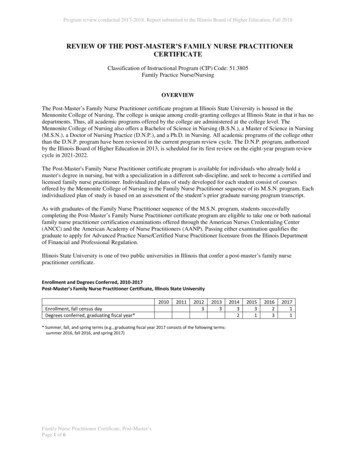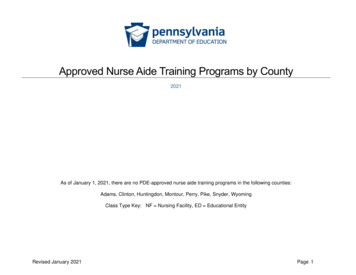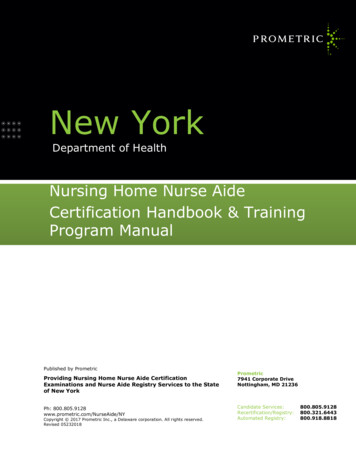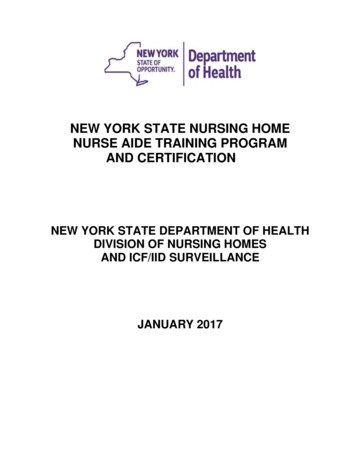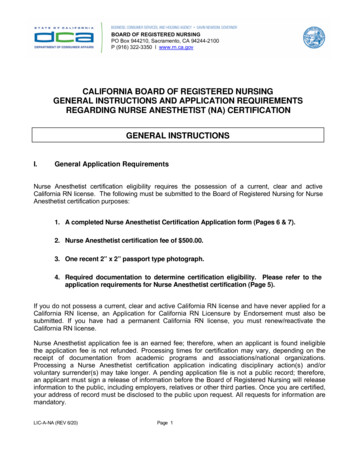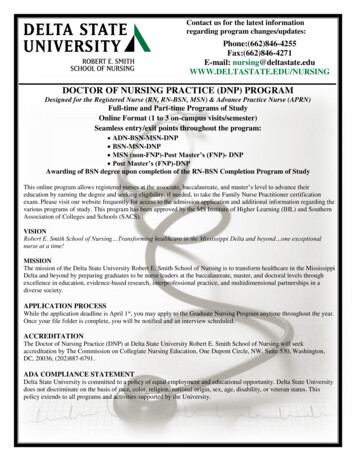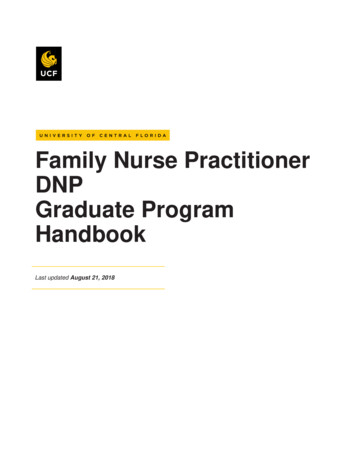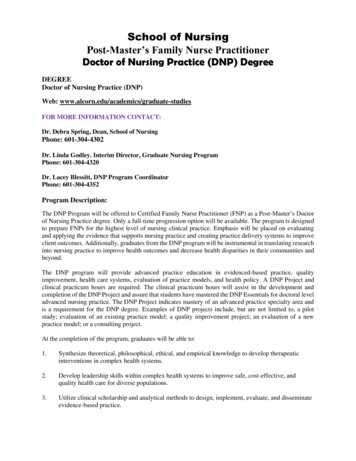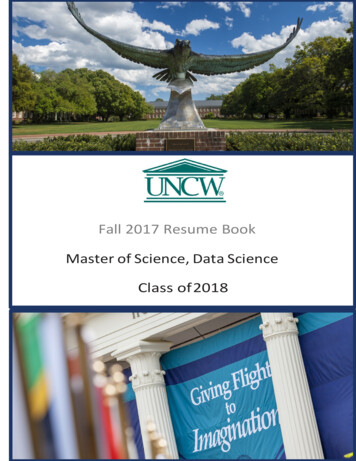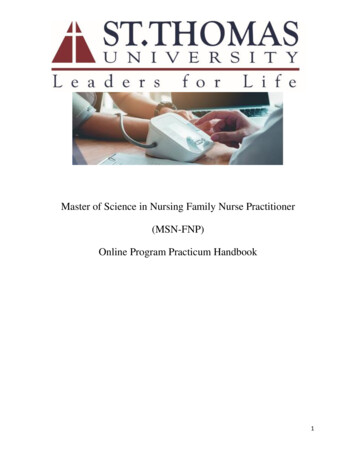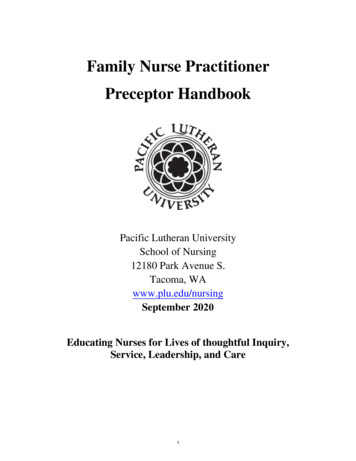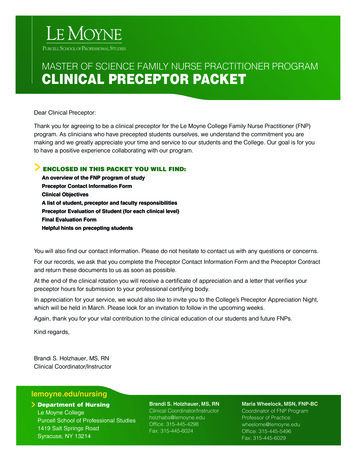
Transcription
MASTER OF SCIENCE FAMILY NURSE PRACTITIONER PROGRAMCLINICAL PRECEPTOR PACKETDear Clinical Preceptor:Thank you for agreeing to be a clinical preceptor for the Le Moyne College Family Nurse Practitioner (FNP)program. As clinicians who have precepted students ourselves, we understand the commitment you aremaking and we greatly appreciate your time and service to our students and the College. Our goal is for youto have a positive experience collaborating with our program. ENCLOSED IN THIS PACKET YOU WILL FIND:An overview of the FNP program of studyPreceptor Contact Information FormClinical ObjectivesA list of student, preceptor and faculty responsibilitiesPreceptor Evaluation of Student (for each clinical level)Final Evaluation FormHelpful hints on precepting studentsYou will also find our contact information. Please do not hesitate to contact us with any questions or concerns.For our records, we ask that you complete the Preceptor Contact Information Form and the Preceptor Contractand return these documents to us as soon as possible.At the end of the clinical rotation you will receive a certificate of appreciation and a letter that verifies yourpreceptor hours for submission to your professional certifying body.In appreciation for your service, we would also like to invite you to the College’s Preceptor Appreciation Night,which will be held in March. Please look for an invitation to follow in the upcoming weeks.Again, thank you for your vital contribution to the clinical education of our students and future FNPs.Kind regards,Brandi S. Holzhauer, MS, RNClinical Coordinator/Instructorlemoyne.edu/nursing Department of NursingLe Moyne CollegePurcell School of Professional Studies1419 Salt Springs RoadSyracuse, NY 13214Brandi S. Holzhauer, MS, RNClinical Coordinator/Instructorholzhabs@lemoyne.eduOffice: 315-445-4298Fax: 315-445-6024Maria Wheelock, MSN, FNP-BCCoordinator of FNP ProgramProfessor of Practicewheelome@lemoyne.eduOffice: 315-445-5496Fax: 315-445-6029
MASTER OF SCIENCE FAMILY NURSE PRACTITIONER PROGRAMPRECEPTOR CONTACT INFORMATION FORMPreceptor’s Name Home Phone ( )EmployerEmployer’s Address:City State ZIPWork Phone ( ) Work Fax ( )Other ( )Email AddressNew York RN License Number Expiration DateNP Certification (include specialty) Expiration DateNew York MD or DO License Number Expiration DateSpecialty Board Certification:Graduate Degree: Major: Date Received:Graduate Educational Institution:Graduate Degree: Major: Date Received:(Please attach your CV/ Résumé to this form)Are you employed by a health system? Yes No Name:Are you credentialed by a health system? Yes No Name:I agree to act as preceptor for for up to hoursStudent’s NamePreceptor Signature: Date: Please return to Clinical Coordinator of FNP Program:Brandi S. Holzhauer, MS, RNLe Moyne College Department of NursingPurcell School of Professional Studies1419 Salt Springs Road, Syracuse, NY 13214lemoyne.edu/nursing Family Nurse Practitioner Programlemoyne.edu/pa1419 Salt Springs Road Syracuse, NY 13214-1301 (315) 445-5426
MASTER OF SCIENCE FAMILY NURSE PRACTITIONER PROGRAMCLINICAL II OBJECTIVES: NSG 672 This is the second clinical rotation in a progressive sequence of Advanced Practice Nursing clinical courses for theFamily Nurse Practitioner student.The course focuses on the practice and refinement of clinical history taking and assessment skills in a primarycare family population under the supervision and guidance of a clinical preceptor.Students perform age-appropriate, comprehensive and focused histories and physical exams in pediatrics,adolescent, and adult reproductive health, and geriatrics. Students continue to gain proficiency with presentingconcise and accurate patient histories and exam findings to their preceptors. Additionally, students work independentlyon diagnostic reasoning skills to develop differential diagnoses and formulate the plan of care for their preceptors’review. More emphasis is placed on patient education with a focus on anticipatory guidance and prevention.Students are required to complete 270 hours of supervised clinical practice before registering for NSG 673.COURSE OBJECTIVESUpon successful completion of this course, the student will be able to:1. Demonstrate proficiency with interviewing, history taking, physical exam skills, and documentation of physicaland psychosocial findings.2. Classify emerging health patterns and priorities for change using a relationship-centered approach.3. Recognize health promotion, risk management, and disease prevention protocols according to specialty(pediatric, adolescent, women’s health, geriatric) populations.4. Apply advanced screening interventions to a specialty population.5. Identify common clinical problems in the specialty population.6. Apply critical decision-making skills in gathering and analyzing client data.7. Integrate concepts from pathophysiology to make differential diagnoses and choose interventions that aremost appropriate for the management of client problems.8. Assess teaching and learning needs of patients, families, groups, and communities.9. Demonstrate competence in documenting physical and psychosocial findings.10. Demonstrate proficiency with presenting patient assessment data.lemoyne.edu/nursinglemoyne.edu/pa Family Nurse Practitioner Program1419 Salt Springs Road Syracuse, NY 13214-1301 (315) 445-5426
NSG 672 FNP Clinical II Evaluation FormStudent Name:Preceptor/Evaluator Name:Final EvaluationPlease use the key below to evaluate the student you are precepting on the following competencies:KEY1 Exceeds standards3 Meets standards inconsistentlyN/A Not Applicable2 Meets standards4 Does not meet standardsCompetency 1: Assess all aspects of client's’ health status1.1Obtains and accurately documents relevant health history1.2Performs and accurately documents appropriate comprehensive or focusedphysical examinations on clients of all ages1.3Identifies health and psychological risk factors of clients (and families if indicated)1.4Distinguishes between normal and abnormal change with aging1.5Identifies signs and symptoms of acute and chronic illness across the lifespan1.6Demonstrates basic understanding of diagnostic tests and screening procedures1.7Begins to formulate differential diagnosesCompetency 2: Implement psychomotor, affective, cognitiveand/or management skills in an accurate, consistent and precise manner2.1Uses equipment skillfully and accordingly2.2Analyzes problems and potential outcomes in order to make the most accurate andcost effective decisions2.3Provides anticipatory guidance, teaching, counseling, and education for theindividual and families2.4Plans, directs, and evaluates according to the goals established, the setting of theactivities, and the persons involvedCompetency 3: Make creative and innovative judgements based on a reasoningprocess that is goal-directed, ethical, and the result of inquiry and analysis3.1Considers alternative approaches when faced with a problem to be solved3.2Considers the ethical outcomes of actions before they are implemented3.3Examines all aspects (physical, psychosocial, developmental, cultural, andspiritual) of a situation when establishing a goal or making judgement that willaffect others3.4Uses resources to solve problems when faced with an unfamiliar or new problem3.5Considers new ways to solve old and repetitive problems1234N/A1234N/A1234N/A
Competency 4: Implement the roles of communicator and researcher4.1Provides clear directives when delegating activities to others4.2Communicates (verbally and written) in a concise, clear, and respectful way toclients, preceptors, staff and faculty4.3Demonstrates professionalism in attire and behavior4.4Demonstrates knowledge of current literature (particularly research literature)related to clinical practice4.5Uses research findings as a basis for discussion with students of for actions takenwith clientsCompetency 5: Demonstrate cultural competence5.1Shows respect for the inherent dignity of every human being regardless of age,gender, religion, socioeconomic class, sexual orientation, and ethnicity5.2Recognizes cultural issues and interact with clients in culturally sensitive ways5.3Provides appropriate educational materials that address the language and culturalbeliefs of clients5.4Incorporates cultural preferences, health beliefs, behaviors and practices into themanagement planCompetency 6: Ensure the quality of health care practice6.1Assumes accountability for practice6.2Engages in self-evaluation concerning practice and uses evaluation information toimprove care and practice6.3Collaborates and/or consults with members of the healthcare team aboutvariations in health outcomes1234N/A1234N/A1234N/AComments (feel free to continue on an additional page and attach if needed):I attest that this student completed hours with me.Preceptor SignatureStudent SignatureDate:Date:
MASTER OF SCIENCE FAMILY NURSE PRACTITIONER PROGRAMCLINICAL III OBJECTIVES: NSG 673 This is the third clinical rotation in a progressive sequence of Advanced Practice Nursing clinical courses for theFamily Nurse Practitioner student.The course, which must be taken simultaneously with NSG 681, focuses the diagnosis and management ofcommon acute and chronic health problems that occur in the family population across the lifespan.Students are expected to gain proficiency with performing histories and physical exams, developing differentialdiagnoses, and a prescribing a plan of care for each patient. Students present each patient and the managementplan to their preceptors for review. Emphasis is placed on professional collaboration and interdisciplinaryconsultation with other health professionals, teaching patients and families, and using evidence-based practice toprescribe and evaluate therapeutic interventions. Students must complete 270 hours of supervised clinicalpractice in this course before registering for NSG 674.COURSE OBJECTIVESUpon successful completion of this course, the student will be able to:1. Demonstrate proficiency with interviewing, history taking, physical exam skills, and documentation of physicaland psychosocial findings.2. Classify emerging health patterns and priorities for change using a relationship-centered approach.3. Recognize health promotion, risk management, and disease prevention protocols according to specialtypopulations across the lifespan.4. Apply advanced screening interventions to a population across the lifespan.5. Identify common clinical problems in populations across the lifespan.6. Apply critical decision-making skills in gathering and analyzing client data.7. Integrate concepts from pathophysiology to make differential diagnoses and choose interventions that aremost appropriate for the management of client problems.8. Assess teaching and learning needs of patients, families, groups, and communities.9. Demonstrate competence in documenting physical and psychosocial findings.10. Demonstrate proficiency with presenting patient assessment data.lemoyne.edu/nursinglemoyne.edu/pa Family Nurse Practitioner Program1419 Salt Springs Road Syracuse, NY 13214-1301 (315) 445-5426
NSG 673 FNP Clinical III Evaluation FormStudent Name:Preceptor/Evaluator Name:Final EvaluationPlease use the key below to evaluate the student you are precepting on the following competencies:KEY1 Exceeds standards3 Meets standards inconsistentlyN/A Not Applicable2 Meets standards4 Does not meet standardsCompetency 1: Assess all aspects of client's’ health status1.1Obtains and accurately documents relevant health history1.2Performs and accurately documents appropriate comprehensive or focusedphysical examinations on clients of all ages1.3Identifies health and psychological risk factors of clients (and families if indicated)1.4Distinguishes between normal and abnormal change with aging1.5Identifies signs and symptoms of acute and chronic illness across the lifespan1.6Demonstrates basic understanding of diagnostic tests and screening procedures1.7Begins to formulate differential diagnosesCompetency 2: Implement psychomotor, affective, cognitiveand/or management skills in an accurate, consistent and precise manner2.1Uses equipment skillfully and accordingly2.2Analyzes problems and potential outcomes in order to make the most accurate andcost effective decisions2.3Provides anticipatory guidance, teaching, counseling, and education for theindividual and families2.4Plans, directs, and evaluates according to the goals established, the setting of theactivities, and the persons involvedCompetency 3: Make creative and innovative judgements based on a reasoningprocess that is goal-directed, ethical, and the result of inquiry and analysis3.1Considers alternative approaches when faced with a problem to be solved3.2Considers the ethical outcomes of actions before they are implemented3.3Examines all aspects (physical, psychosocial, developmental, cultural, andspiritual) of a situation when establishing a goal or making judgement that willaffect others3.4Uses resources to solve problems when faced with an unfamiliar or new problem3.5Considers new ways to solve old and repetitive problems1234N/A1234N/A1234N/A
Competency 4: Implement the roles of communicator and researcher4.1Provides clear directives when delegating activities to others4.2Communicates (verbally and written) in a concise, clear, and respectful way toclients, preceptors, staff and faculty4.3Demonstrates professionalism in attire and behavior4.4Demonstrates knowledge of current literature (particularly research literature)related to clinical practice4.5Uses research findings as a basis for discussion with students of for actions takenwith clientsCompetency 5: Demonstrate cultural competence5.1Shows respect for the inherent dignity of every human being regardless of age,gender, religion, socioeconomic class, sexual orientation, and ethnicity5.2Recognizes cultural issues and interact with clients in culturally sensitive ways5.3Provides appropriate educational materials that address the language and culturalbeliefs of clients5.4Incorporates cultural preferences, health beliefs, behaviors and practices into themanagement planCompetency 6: Ensure the quality of health care practice6.1Assumes accountability for practice6.2Engages in self-evaluation concerning practice and uses evaluation information toimprove care and practice6.3Collaborates and/or consults with members of the healthcare team aboutvariations in health outcomes1234N/A1234N/A1234N/AComments (feel free to continue on an additional page and attach if needed):I attest that this student completed hours with me.Preceptor SignatureStudent SignatureDate:Date:
MASTER OF SCIENCE FAMILY NURSE PRACTITIONER PROGRAMCLINICAL IV OBJECTIVES: NSG 674 This is the final clinical rotation in a progressive sequence of Advanced Practice Nursing clinical courses for theFamily Nurse Practitioner student.The course, which must be taken simultaneously with NSG 682 and cannot be taken until all hours arecompleted in NSG 673, continues to focus on the diagnosis and management of acute and chronic healthproblems in the family population. However more emphasis is placed on the student’s independentmanagement of increasingly complex patients.Students are expected to be proficient with performing histories and physical exams, developing differentialdiagnoses, and prescribing a plan of care for each patient. Students present each patient and an independentlyformed management plan to their preceptors for review. Emphasis is placed on professional collaboration andinterdisciplinary consultation with other health professionals, teaching patients and families, accountability andpatient advocacy, and using evidence-based practice to prescribe and evaluate therapeutic interventions.Students must complete 270 hours of supervised clinical practice in this course.COURSE OBJECTIVESUpon successful completion of this course, the student will be able to:1. Demonstrate proficiency with interviewing, history taking, physical exam skills, and documentation of physicaland psychosocial findings.2. Classify emerging health patterns and priorities for change using a relationship-centered approach.3. Incorporate health promotion, risk management, and disease prevention protocols in the plan of care accordingto specialty populations across the lifespan.4. Apply advanced screening interventions to a specialty population across the lifespan.5. Identify common clinical problems in populations across the lifespan.6. Apply critical decision-making skills in gathering and analyzing client data.7. Integrate concepts from pathophysiology to make differential diagnoses and choose interventions that are mostappropriate for the management of client problems.8. Assess teaching and learning needs of patients, families, groups, and communities.9. Advocate for patients, families, groups, and communities based on holistic bio-psycho-social needsassessment.10. Demonstrate proficiency in documenting physical and psychosocial findings.11. Demonstrate proficiency with presenting patient assessment data.lemoyne.edu/nursinglemoyne.edu/pa Family Nurse Practitioner Program1419 Salt Springs Road Syracuse, NY 13214-1301 (315) 445-5426
NSG 674 FNP Clinical IV Evaluation FormStudent Name:Preceptor/Evaluator Name:Final EvaluationPlease use the key below to evaluate the student you are precepting on the following competencies:KEY1 Exceeds standards3 Meets standards inconsistentlyN/A Not Applicable2 Meets standards4 Does not meet standardsCompetency 1: Assess all aspects of client's’ health status1.1Obtains and accurately documents relevant health history1.2Performs and accurately documents appropriate comprehensive or focusedphysical examinations on clients of all ages1.3Identifies health and psychological risk factors of clients (and families if indicated)1.4Distinguishes between normal and abnormal change with aging1.5Identifies signs and symptoms of acute and chronic illness across the lifespan1.6Demonstrates basic understanding of diagnostic tests and screening procedures1.7Begins to formulate differential diagnosesCompetency 2: Implement psychomotor, affective, cognitiveand/or management skills in an accurate, consistent and precise manner2.1Uses equipment skillfully and accordingly2.2Analyzes problems and potential outcomes in order to make the most accurate andcost effective decisions2.3Provides anticipatory guidance, teaching, counseling, and education for theindividual and families2.4Plans, directs, and evaluates according to the goals established, the setting of theactivities, and the persons involvedCompetency 3: Make creative and innovative judgements based on a reasoningprocess that is goal-directed, ethical, and the result of inquiry and analysis3.1Considers alternative approaches when faced with a problem to be solved3.2Considers the ethical outcomes of actions before they are implemented3.3Examines all aspects (physical, psychosocial, developmental, cultural, andspiritual) of a situation when establishing a goal or making judgement that willaffect others3.4Uses resources to solve problems when faced with an unfamiliar or new problem3.5Considers new ways to solve old and repetitive problems1234N/A1234N/A1234N/A
Competency 4: Implement the roles of communicator and researcher4.1Provides clear directives when delegating activities to others4.2Communicates (verbally and written) in a concise, clear, and respectful way toclients, preceptors, staff and faculty4.3Demonstrates professionalism in attire and behavior4.4Demonstrates knowledge of current literature (particularly research literature)related to clinical practice4.5Uses research findings as a basis for discussion with students of for actions takenwith clientsCompetency 5: Demonstrate cultural competence5.1Shows respect for the inherent dignity of every human being regardless of age,gender, religion, socioeconomic class, sexual orientation, and ethnicity5.2Recognizes cultural issues and interact with clients in culturally sensitive ways5.3Provides appropriate educational materials that address the language and culturalbeliefs of clients5.4Incorporates cultural preferences, health beliefs, behaviors and practices into themanagement planCompetency 6: Ensure the quality of health care practice6.1Assumes accountability for practice6.2Engages in self-evaluation concerning practice and uses evaluation information toimprove care and practice6.3Collaborates and/or consults with members of the healthcare team aboutvariations in health outcomes1234N/A1234N/A1234N/AComments (feel free to continue on an additional page and attach if needed):I attest that this student completed hours with me.Preceptor SignatureStudent SignatureDate:Date:
FAMILY NURSE PRACTITIONER PROGRAMROLES AND RESPONSIBILITIES OFPRECEPTOR, STUDENT AND FACULTYClinical education, under the supervision of skilled preceptors, provides students with the practicalexperience they need to develop as advanced practice nurses. Arguably, the most important responsibilityof the preceptor is to socialize the student to the role of the nurse practitioner as health care providerthrough both formal and informal education. The preceptor guides the student’s clinical learningexperience, facilitates student autonomy, and acts as a role model. ROLE OF THE PRECEPTOR AS CLINICIAN AND EDUCATOR} Directs overall goals and objectives for the practicum experience based on student outcomeobjectives provided by the College faculty.} Assists the student in applying theory to practice.} Evaluates the student’s identified learning objectives.} Assesses the nature of particular patient-care encounters that will enable the student to meethis or her learning objectives at this level in the nurse practitioner curriculum.} Utilizes appropriate teaching methods to helpthe student meet his or her learning objectives.} Assists the student to develop and improveperformance.} Evaluates whether the student’s learningobjectives have been achieved.} Provides the student with feedback.} Integrates the student into the role of thenurse practitioner.} Demonstrates attitudes and qualities consistentwith leadership and ethics in the healthprofessions, including autonomy, civility,non-maleficence and justice.} Provides ongoing and final evaluations ofstudent performance.} Assists the faculty in the evaluation of pa Family Nurse Practitioner Program1419 Salt Springs Road Syracuse, NY 13214-1301 (315) 445-5426
PRECEPTOR, STUDENT AND FACULTY RESPONSIBILITIESPRECEPTOR RESPONSIBILITIES} Facilitate an informal, collaborative and mutuallyrespectful environment in which to learn.} Orient student to the clinical site and agency policies} Discuss with the student the preferred method forcommunication with clinical preceptor and/or clinic site.} Review with the student the site’s patient population,most frequent diagnoses, and procedures commonlyperformed.} Discuss preceptor and agency expectations for thedocumentation of patient encounters.} Review the objectives of the course and student’sclinical objectives to determine the type of learningopportunities that will enhance the student’s learning.} Direct the student to resources and evidence-basedreadings.} Discuss guidelines for student interactions and feedbackon student performance.} Listen and provide constructive feedback on student’spresentation of each patient seen.} Provide daily feedback to improve the student’s assessment and management skills.} Provide a variety of learning experiences withappropriate client populations. If appropriate, encourageparticipation in interdisciplinary team meetings.} Facilitate student’s progressive independence in clinicalknowledge and skills.} Assume responsibility for providing a substitute preceptor in the event of an absence.} Promptly communicate issues of concern or unsafepractice (student behavior, clinical skills, and/or studentprogression) regarding the student to the clinical faculty.} Complete student’s midterm and final clinical evaluationand review with clinical faculty.} Verify the student’s clinical hours on the evaluation form.} Complete Preceptor Information Form and completeabbreviated Curriculum Vitae Form prior to the studentbeginning the clinical experience.
STUDENT RESPONSIBILITIES} Integrate personal learning objectives with course objectives.} Contact clinical preceptor and determine the schedule for the clinicalexperience, including days of week and hours per day.} Develop and share daily clinical learning needs and objectives withpreceptor and discuss strategies to meet them.} Adhere to professional attire that is in accordance withclinical site requirements and the Le Moyne College Departmentof Nursing professional dress code.} Maintain professional behavior in the clinical setting at all times.} Complete required clinical course paperwork and submit it on time.} Collect and enter patient encounter data in electronic clinicallog within 24 hours of the clinical experience.} Demonstrate increasing competencies and progressiveindependence in clinical knowledge and skills.} Take on the role of nurse practitioner under the supervision ofthe preceptor. Incorporate evidence-based practice guidelinesand follow clinical site policies.} Complete clinical preceptor and clinical site evaluations at theend of the clinical rotation.} Attend all scheduled clinical experiences on time and prepared,completing all required clinical hours for each clinical course.} Notify clinical preceptor and clinical faculty as soon as possible if unable to attend clinical as scheduled and arrange make-up clinical day. students gain valuablepractical experience
CLINICAL FACULTY RESPONSIBILITIES} Communicate with clinical preceptor regarding student’s performance andrequirements of specific clinical rotation at beginning of semester, mid-semester,and end of semester.} Assist student and preceptor to optimize clinical learning environment.} Regularly review clinical electronic log entries.} Evaluate written assignments and provide feedback.} Complete phone conference at midterm and at end of semester with preceptorto discuss student’s clinical evaluation.} Be available to clinical preceptor to answer questions or concerns regardingthe student’s clinical experience.} Provide preceptor with preferred method of communication and be available topreceptor at all times.} Award the student’s final grade upon achievement of clinical competencies.} Review the student’s evaluation of the clinical preceptor and clinical site andmake recommendations to clinical coordinator as appropriate for ongoing use.lemoyne.edu/pa
FAMILY NURSE PRACTITIONER PROGRAMPRECEPTOR TEACHING TIPS PRECEPTOR TEACHING TIPS1. Avoid using the same teaching-learningapproach for everyone.Students learn in many ways. Some are visual,oral or written learners, some concrete andsome abstract, and others are multidimensional.Recognize that your style of learning may be verydifferent from the student’s.2. Spend some time to know your student.Find out your student’s talents, prior experiences,and learning needs. This information helps youknow how to best guide the student. Knowing thestudent’s current knowledge base and readinessto learn helps both of you know how much workyou have ahead of you. This is essential to helpthe student see the gap between where he isand where he needs to be.3. Create a positive and safe learningenvironment.Students are more likely to take risks when theteacher creates a safe environment. Admittingwhat one doesn’t know or making a wrongdecision is an uncomfortable feeling for anyone.Allow students the opportunity to learn fromtheir mistakes. Establish mutual trust, respectand support.4. Give frequent feedback along the way, not justat the end.Students need to have information about theirbehavior and performance as they are learning. Focus on the performance, not the person.Involve the learner in the self-evaluation process.5. Share your passion.If the teacher has passion for the art and science of nursingand health care, the student is likely to emulate it. You areteaching by example all of the time. Students learn as muchfrom observing your behavior and communication of caring asthey do from listening.6. Repeat the important points.State the most important points more than once and in variousways. The first time something is stated it is heard and will berecognized, but it takes repetition and application to be learned.Repeat the important points.7. Ask questions.Learning requires exploring the unknown and considering ideasfrom a different perspective. The preceptor guides the studentto seek a deeper understanding. For example, “How does thatwork?” “What would have happened if we had done exactlyopposite of what you suggested?” You are teaching the studenthow to think. Ask questions that encourage students todemonstrate the thinking process that led to the right answer.lemoyne.edu/nursinglemoyne.edu/pa Family Nurse Practitioner Program1419 Salt Springs Road Syracuse, NY 13214-1301 (315) 445-5426
PROGRESSION OF ANURSE PRACTITIONER STUDENT8. Talk through your decision-making process.Share the process you go through in making decisions.Problem-solving skills can be learned. Point out the factorsin the clinical situation that gui
Family Nurse Practitioner student. The course focuses on the practice and refinement of clinical history taking and assessment skills in a primary care family population under the supervision and guidance of a clinical preceptor. Students perform age-appropriate, comprehensiv
